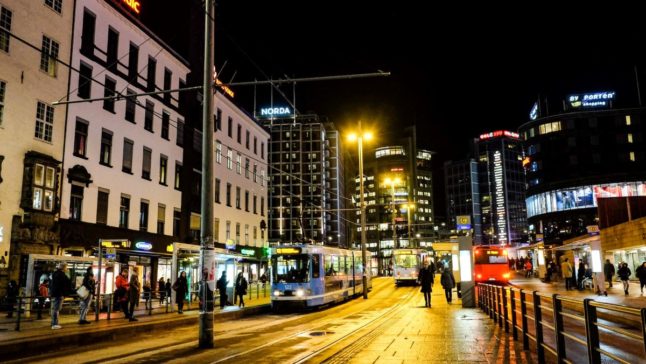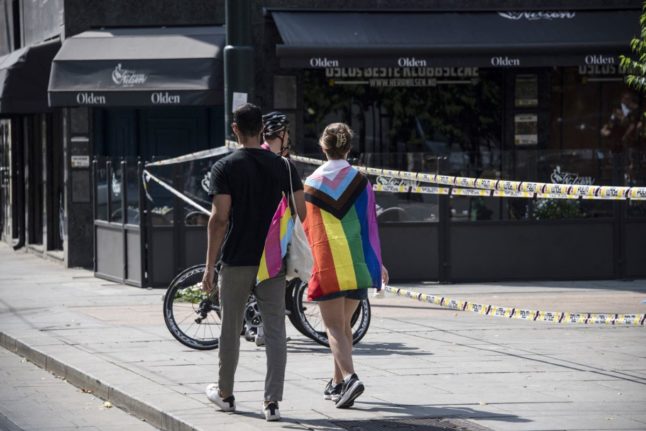When measured by total incidents, Oslo has the second-highest number of crimes reported out of all of Norway’s counties, according to figures from the national data agency Statistics Norway.
However, this is due to Oslo being the second-most populated county in Norway, after Viken. When using the population to measure crime, Oslo is the county in Norway with the lowest crime rate.
The crime rate in Oslo per 1,000 residents was 38.71 in 2021, according to Statistics Norway. Figures for 2022 were not available at the time of writing.
So all-in-all, it should feel like a pretty safe place, right? Well, yes, according to our readers. We ran a recent poll on safety in Oslo, asking foreigners whether they felt safe in the Norwegian capital.
Just under 60 percent said they felt very safe in Oslo, while 15 percent responded to the survey as feeling slightly safe. Some 11 percent said they felt a little unsafe, while the rest said they didn’t have a particular view on whether they felt secure.
“Police presence makes me feel safe. An easy atmosphere makes me feel safe. Well-lit areas and cleanliness also make me feel safe in Oslo,” Emma, who lives in Oslo, wrote when asked what made Oslo feel like a safe city.
Another reader who didn’t leave a name wrote, “(I’ve) never felt unsafe in the city, regardless of place or time”.
Mark, who regularly visits his daughter in Oslo, said that the capital felt safe as very few people looked threatening or unstable.
Meanwhile, Ewa wrote that several things contributed to Oslo feeling like a safe city.
“Oslo is safe due to (a) nice culture and awareness among citizens. Even in areas with many immigrants, you might feel strange but not in danger. There is also no conflicts or gangs. You also see police from time to time, and you know that if you need help, you’ll receive (it)”, Ewa, who lives in Oslo, wrote.
Our results align roughly with a survey carried out on behalf of the Norwegian newspaper Aftenposten and public broadcaster NRK which found that just under 80 percent of residents in Oslo felt safe.
Some of those who did respond to our survey did, however, share that they avoided certain parts of the city if possible.
“I feel safe if I avoid some parts of Oslo, (for example,) Grønland, Tøyen, Ankertorget etc at night,” Kari wrote.
“There are parts of Oslo that feel less safe, like Grønland/Grunerløkka, for example. As a woman, I have felt unsafe on my own there because I have encountered groups of men & have been stared at/watched by men & have encountered several drunk/high people before. I feel safe in most parts of the city, though,” Samantha wrote.
Emma, who described the police presence in Oslo as one of the things making the capital feel safe also said that they, too, felt uncomfortable being stared at by large groups of men made them feel unsafe while out and about.
“Men in groups gathered together and following me or watching where I go makes me feel unsafe,” she wrote.
Another who didn’t leave a name pointed to groups of men loitering in unlit areas, which made them feel unsafe in Oslo, even if they felt very safe overall. In 2021, there were 1,846 sexual offences reported to the police in Oslo.
Separately, another resident described several incidents which led to them responding to the survey by saying they felt slightly unsafe in Oslo.
“In only one year, I have seen burglary in my building twice, bikes getting stolen, a terrorist bar attack (in June 2022, the LGBT community in Oslo was targeted in a shooting in the city centre), several stabbing (incidents). Maybe Norway is just too quiet that any accidents like this make us frightened,” the resident who didn’t leave a name wrote.
Norwegians themselves may also be feeling warier following several high-profile shootings in Oslo. According to the survey published by NRK, four out of ten said that they become more cautious when out in Oslo.
The high number of theft the reader witnessed may not be a coincidence, as property theft was the most commonly reported crime in Oslo in 2021. Out of 57,00 offences reported in 2021, 21,000 were property theft, such as bike theft or burglary, according to figures from Statistics Norway.



 Please whitelist us to continue reading.
Please whitelist us to continue reading.
Member comments